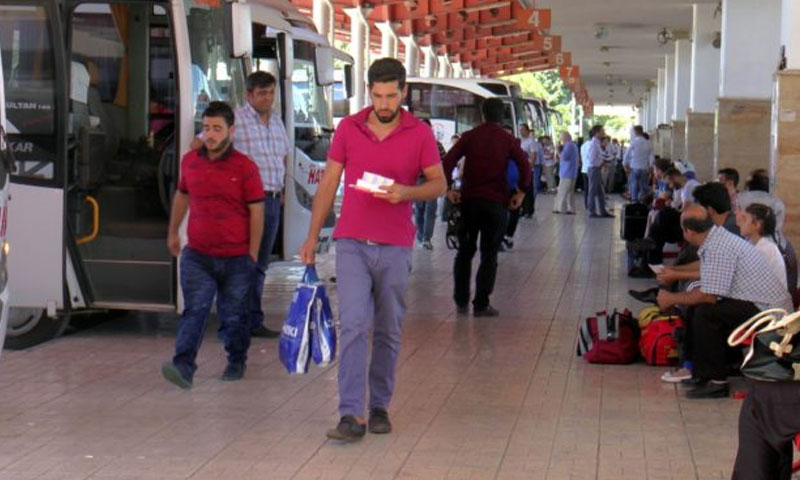The young man “Abo,” a local nickname derived from the name Ibrahim, admits the risks of his job that is transporting Syrian passengers, who do not have a legal travel authorization through the Turkish provinces. However, at the same time, he believes that his job is an attempt to help these people.
“Our work is secretive; it incubates many dangers and costs fines. But we are trying to help the people,” Abo tells Enab Baladi.
The job, that can be described as “smuggling Syrians” through the Turkish provinces, has became active in the past a few months, after the Turkish authorities has banned Syrians, located on its territory, from traveling without an official travel authorization, while they stopped issuing the authorization in the majority of the Turkish provinces due to security reasons, “necessities.” The problem has another face to it, for even if the authorities allowed the people a chance to get the required authorization, they have to offer the government employee a convincing reason as to get the document.
A Journey Full of Risks
The smuggling process is conducted through a phone call with Turkish citizens, who mostly speak Arabic, with a local accent (Kurdish or Arabic). These people are brokers who own small and medium vehicles that transport the passengers in an illegal manner. The deal includes, specifying the number of seats that the passenger would like to reserve, the passengers’ gathering point, the destination and the required fee according to each passenger’s destination. Most of the time, the fee is the double of the actual fee requested in those areas.
“Abo,” a Kurdish young man from Syria, refused to reveal his real name or any details relating to his life, told Enab Baladi that “I organize a journey every three days, from the city of Urfa to Istanbul, passing through different provinces, including Gaziantep, Osmaniye, Adana, Konya and Ankara,” pointing out that the journey takes between 21 to 24 hours, because he avoids the major roads and maneuvers the checkpoints at the roads and the provinces’ gates.
In his small bus, the young man transports 18 to 20 passengers each journey, even though the vehicle has 15 seats only, which leads the rest of the passengers to sit on the bus’s floor.
The seat’s fee varies according to the passenger’s destination. From Urfa to Istanbul, the journey costs 250 Turkish Liras, to decrease when the distance shortens. Accordingly, the fee from Urfa to Gaziantep costs 60 TL, 75 to Adana and 200 to Ankara. The fee is not fixed, for it might increase or decrease according to the number of the passengers, as it increases with massive demand on traveling.
The young man believes that the fee he takes from the passengers who wish to travel, mostly young men seeking jobs in other provinces, is a little amount in exchange for a secure arrival to the target destination and to escape the checkpoints, considering that his job facilitates many Syrian people’s lives and that the he is not exploiting their circumstances, especially that the adventure poses danger to him first of all, as the Turkish police is trying hard to prevent these operations and is persecuting the buses which passengers do not own a travel authorization.
Seeking Jobs Necessitates the Smuggling Operations
Many reasons force Syrians to travel between the Turkish provinces, including searching for a job in other provinces or family visits, despite the threats of travailing in such an illegal manner, as it might lead to an ultimate deportation from Turkey.
Mohammad, 19 years old young man, followed this method to travel from the Tell Abyad camp, told Enab Baladi that these journeys are risky, but I am forced to board these buses after many failed attempts to get a travel authorization.”
Mohammad has mentioned the troubles that might happen during these journeys, for some travelers might not have any sort of identification documents, neither Turkish nor Syrian. These people might face real danger if they were to meet the Turkish police, which sometimes end with deportation, in addition to the travelers’ fear, as some buses tend to smuggle drugs and cigarettes, which affect the regular travelers, who would have been more secure if they were to travel in a legal manner.
For her part, Reem, a Syrian young woman in her twenties, travels every month accompanied by her husband and children from Urfa to visit her family in Adana; she told Enab Baladi that “throughout the journey she keeps praying as to safely reach her destination,” appealing to the Turkish authorities to simplify the procedures of issuing a travel authorization, “because getting these papers will facilitate our life, work and will help us by saving enough amounts of the money that is going to the smugglers.”

